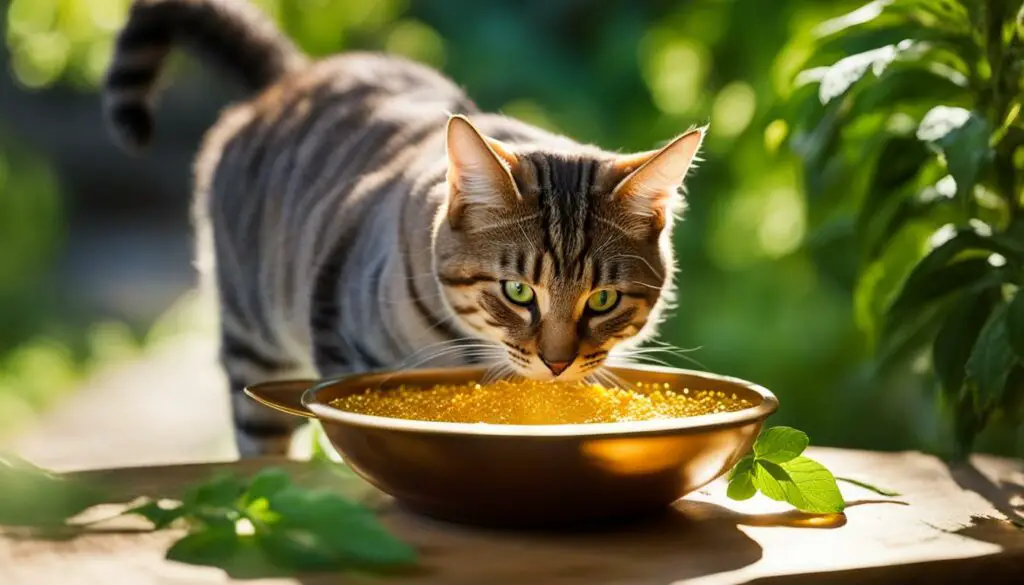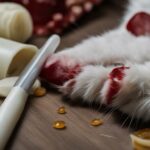As a cat owner, I understand the concern you may have about what foods are safe for your feline friend. One common question that arises is whether cats can have honey. In this article, I will delve into the topic of cats and honey, exploring the potential benefits, risks, and considerations when it comes to incorporating honey into your cat’s diet.
Key Takeaways:
- Cats are obligate carnivores and have different dietary needs than humans.
- Honey has antioxidant and antibacterial properties but limited evidence supports its use for other health issues in cats.
- Consult with a veterinarian before introducing honey into your cat’s diet.
- Honey may offer potential benefits for cats but should be used sparingly and under veterinary guidance.
- Raw honey is preferred over processed honey for potential health benefits.
The Potential Benefits of Honey for Cats
Honey offers potential benefits to cats due to its antioxidant and antibacterial properties. While the scientific evidence is inconclusive, some cat owners may choose to incorporate honey into their cat’s diet for potential health benefits. It’s important to note that cats are obligate carnivores and have different dietary needs than humans, so any changes or additions to their diet should be made under the guidance of a veterinarian.
Honey is a natural antioxidant, which means it can help protect the body from harmful free radicals. It also has antibacterial properties, which may help support the immune system and aid in fighting off infections. However, it’s important to note that the scientific research on the specific benefits of honey for cats is limited, and more studies are needed to fully understand its effects.
While some cat owners may choose to give their cats honey in small amounts, it’s important to monitor their reaction and discontinue use if any adverse symptoms occur. Cats, especially kittens, may have difficulty swallowing honey due to their small throats and stomachs. Honey can also cause digestive issues, such as vomiting and diarrhea, in some cats. Additionally, honey is calorie-dense and can contribute to weight gain, which is a concern for cats with diabetes or overweight cats. It’s always best to consult with a veterinarian before introducing honey into a cat’s diet.

Honey for Cats with Allergies
When it comes to cats with allergies, some owners have wondered if honey can provide relief. While honey is known for its natural antioxidant properties and potential immune-boosting effects, there is limited evidence to support its use as a treatment for cat allergies. It’s important to note that allergies in cats can have various causes, including environmental factors, food sensitivities, or insect bites. Consulting with a veterinarian is crucial in order to properly diagnose and manage your cat’s allergies.
While honey may have potential benefits for cats with allergies, it’s important to recognize that individual responses can vary. Allergies can manifest differently in different cats, and what works for one may not work for another. If you are considering using honey as a potential remedy for your cat’s allergies, it is essential to consult with a veterinarian first to ensure that it is safe and appropriate for your feline companion.
Remember: Honey should never replace proper veterinary care and allergy management for your cat. If your cat is experiencing symptoms of allergies, such as excessive scratching, sneezing, or skin irritations, make sure to seek professional advice from a qualified veterinarian. They can provide an accurate diagnosis and recommend appropriate treatment options for your cat’s specific situation.
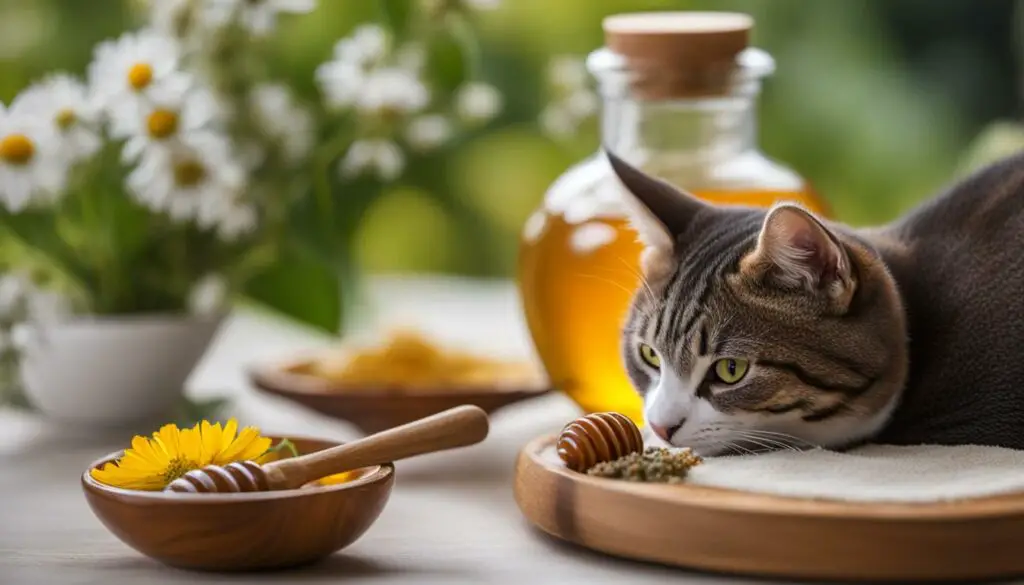
| Tips for Managing Cat Allergies: |
|---|
| 1. Consult with a veterinarian for a proper diagnosis and treatment plan. |
| 2. Identify and remove potential allergens from your cat’s environment, such as dust, pollen, or certain cleaning products. |
| 3. Consider dietary changes if food allergies are suspected. Work with your veterinarian to determine the best hypoallergenic diet for your cat. |
| 4. Follow any prescribed medications or treatments as directed by your veterinarian. |
| 5. Regularly groom your cat to remove potential allergens from their fur. |
| 6. Provide a clean and allergen-free living environment for your cat. |
Overall, while honey may have potential benefits for cats, it is essential to prioritize proper veterinary care and consult with a professional before introducing any new remedies into your cat’s diet or treatment plan. Your veterinarian will be able to provide personalized guidance based on your cat’s specific needs, ensuring their health and well-being are properly managed.
The Risks of Feeding Cats Honey
While honey is not considered toxic to cats, there are some risks associated with feeding them honey. It’s important to be aware of these potential risks and monitor your cat’s reaction closely if you choose to introduce honey into their diet.
Allergic Reactions
Some cats may have allergic reactions to honey. Symptoms can include itching, swelling, hives, or difficulty breathing. If you notice any of these signs, discontinue feeding your cat honey and consult with a veterinarian.
Digestive Issues
Honey is high in natural sugars, and some cats may have difficulty digesting it properly. Feeding your cat too much honey can lead to digestive issues such as vomiting or diarrhea. It’s best to start with a small amount and monitor your cat’s response.
| Risks of Feeding Cats Honey | Precautions |
|---|---|
| Allergic reactions | Monitor your cat for signs of allergies such as itching, swelling, or difficulty breathing. Discontinue use if any allergic reactions occur. |
| Digestive issues | Start with a small amount of honey and monitor your cat’s digestion. If vomiting or diarrhea occurs, discontinue feeding honey. |
| Weight gain | Honey is calorie-dense, so it can contribute to weight gain in cats. Use honey sparingly and consider your cat’s overall calorie intake. |
| Botulism | Young kittens are particularly susceptible to the bacterium that causes botulism, which can be found in honey. Avoid feeding honey to kittens. |
Weight Gain
Honey is calorie-dense, meaning it contains a lot of calories in a small volume. Feeding your cat too much honey could contribute to weight gain, especially if they already have a tendency to gain weight easily. Monitor your cat’s overall calorie intake and use honey sparingly.
Botulism Risk for Kittens
Kittens are at a higher risk of developing botulism from honey. The bacterium that causes botulism can be found in honey, and young kittens have less developed immune systems, making them more susceptible. It’s best to avoid feeding honey to kittens and focus on providing them with a balanced kitten-specific diet.
While honey can offer potential benefits for cats, it’s important to be aware of the risks and use it in moderation. Before introducing honey into your cat’s diet, consult with a veterinarian to ensure it is safe and appropriate for your cat’s individual health needs. Remember to monitor your cat’s reaction and discontinue use if any adverse symptoms occur.
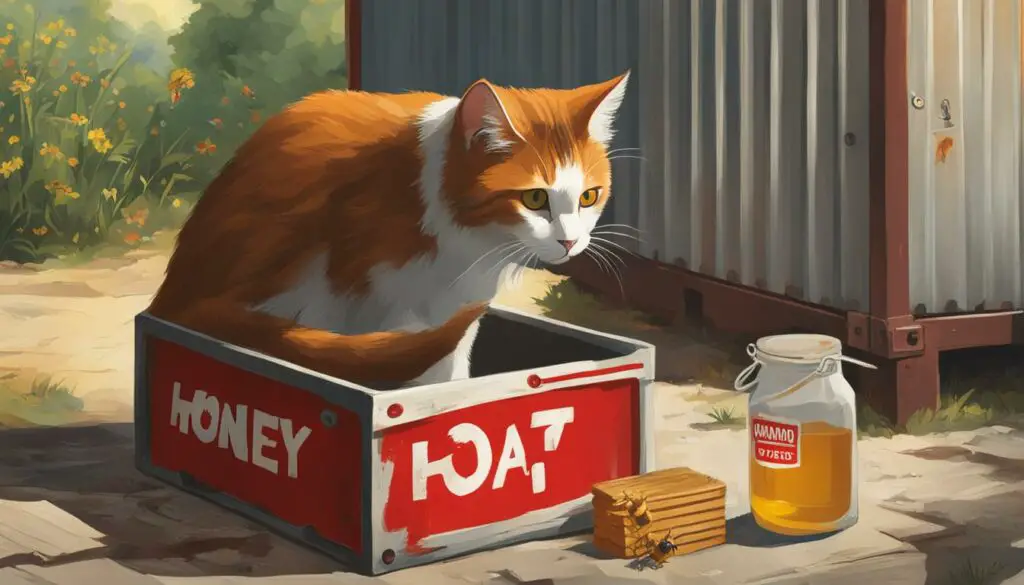
Manuka Honey for Wound Management in Cats
When it comes to wound management in cats, manuka honey has emerged as a potential solution. Manuka honey, which is produced by bees in New Zealand and Australia, is known for its strong antibacterial properties and ability to promote natural healing processes.
Unlike traditional honey, manuka honey contains a unique compound called methylglyoxal (MGO), which is responsible for its antibacterial activity. This makes it an effective option for treating wounds in cats. When applied topically, manuka honey can help prevent infection, reduce inflammation, and accelerate the healing process.
“Manuka honey’s antibacterial properties make it an excellent choice for wound management in cats. It can help keep the wound clean, prevent infection, and promote faster healing,” says Dr. Emily Carter, a veterinarian specializing in feline health.
It’s important to note that manuka honey should only be used under the guidance of a veterinarian. The vet can assess the severity of the wound and determine the appropriate application method and frequency. They can also provide proper wound care instructions to ensure the best outcome for the cat’s recovery.
| Benefits of Manuka Honey for Wound Management in Cats | Application Method | Frequency |
|---|---|---|
| Promotes natural healing processes | Topical application | As advised by the veterinarian |
| Prevents infection | Directly on the wound or wound dressing | Depends on the severity of the wound |
| Reduces inflammation | Apply a thin layer to the affected area |
Remember, never attempt to treat a cat’s wound at home without proper veterinary guidance. Wounds can be complex and require appropriate medical attention. Consult with a veterinarian to determine if manuka honey is the right option for your cat’s wound management.
Honey as a Dietary Supplement for Cats
When it comes to honey, can cats eat it as a dietary supplement? While cats are obligate carnivores with specific dietary needs, some cat owners may choose to incorporate small amounts of honey into their cat’s diet. Honey is not a necessary dietary supplement for cats, but it can be given in moderation after consulting with a veterinarian.
Honey offers potential health benefits for cats due to its antioxidant and antibacterial properties. However, it’s important to start with a small amount, such as half a teaspoon a day, and monitor the cat’s reaction. If the cat shows any adverse symptoms, it’s best to discontinue the use of honey.
Please consult the table below for a summary of the key points to consider when using honey as a dietary supplement for cats:
| Key Points | Information |
|---|---|
| Honey as a Supplement? | Honey is not a necessary dietary supplement for cats, but can be given in moderation. |
| Consult with a Veterinarian | Always consult with a veterinarian before introducing honey into a cat’s diet. |
| Start with Small Amounts | Start with a small amount, such as half a teaspoon a day, and monitor the cat’s reaction. |
| Discontinue if Adverse Symptoms | If the cat shows any adverse symptoms, discontinue the use of honey. |
Remember, a balanced diet that meets all of a cat’s nutritional needs is essential. Honey should only be used as a supplement and should not replace a high-quality cat food formulated for their specific life stage and health needs. Always consult with a veterinarian for guidance on using honey as a dietary supplement for your cat.
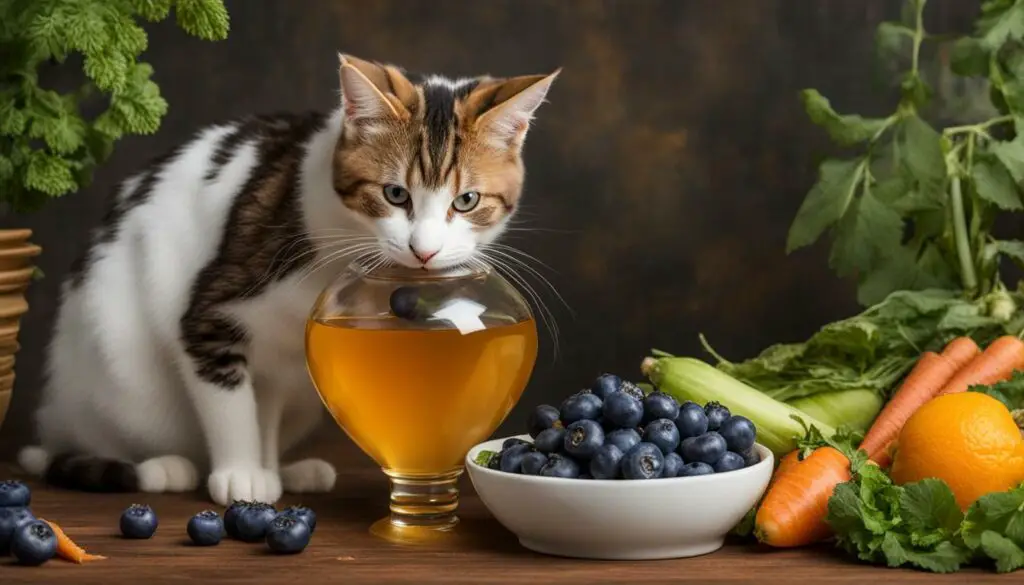
Processed Honey vs. Raw Honey for Cats
When considering honey for cats, it’s important to understand the differences between processed honey and raw honey. Processed honey has undergone various treatments, such as heating and filtering, which can strip away many of its natural health properties. On the other hand, raw honey is unprocessed and retains more of its original nutrients and beneficial components.
Raw honey is rich in antioxidants, which help combat free radicals and support overall immune health in cats. It also contains enzymes and natural antibacterial properties that can promote digestive health and aid in wound healing. Additionally, raw honey may have anti-inflammatory effects, which can be beneficial for cats with certain health conditions.
Processed honey, on the other hand, may have additives, such as sugar or syrup, that can be harmful to cats. These additives can contribute to weight gain and potentially lead to health issues like diabetes. When choosing honey for your cat, it’s best to opt for raw honey sourced from reputable suppliers. This ensures that your cat is receiving the most natural and beneficial form of honey without any potentially harmful additives.
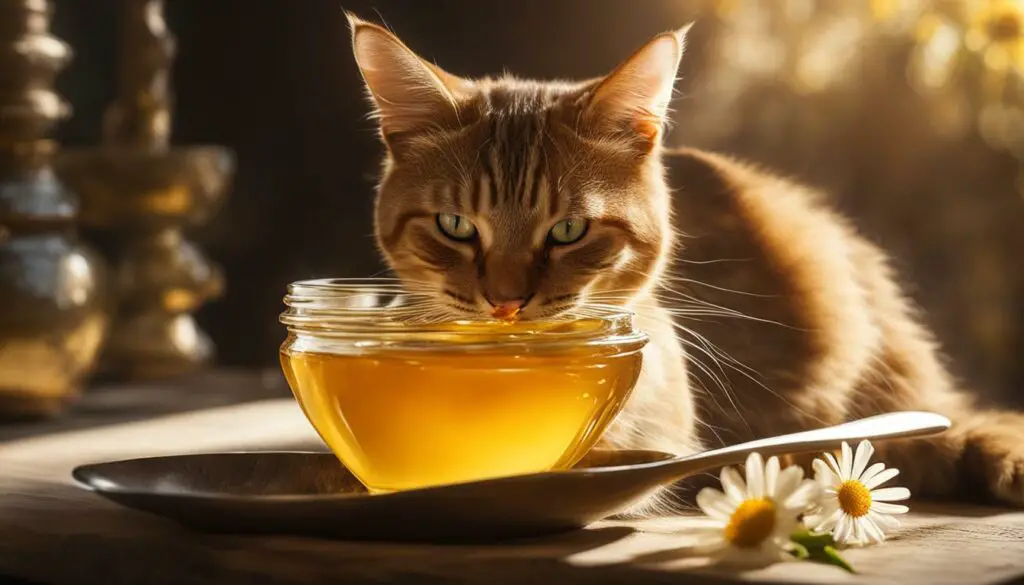
Honey and Kittens
When it comes to feeding kittens, it’s important to approach their diet with caution and prioritize their specific needs. While honey may be a beloved natural sweetener for humans, it’s generally not recommended to feed honey to kittens. There are several risks associated with giving honey to kittens, including their small throats, stomachs, and developing immune systems.
Honey can pose a choking hazard for kittens due to its sticky consistency and the small size of their throats. It may be difficult for them to swallow and could potentially lead to aspiration or choking. Additionally, honey can contain bacterial spores that can cause serious illness, such as botulism, in kittens. Their developing immune systems are more susceptible to these bacteria, making them more vulnerable to potential health risks from honey consumption.
Considering these risks, it’s best to avoid giving honey to kittens altogether. Instead, focus on providing them with a balanced diet that meets their specific nutritional needs. High-quality kitten-specific cat food is formulated to provide the necessary nutrients for their growth and development. By prioritizing their complete and balanced diet, you can ensure the health and well-being of your fur baby.
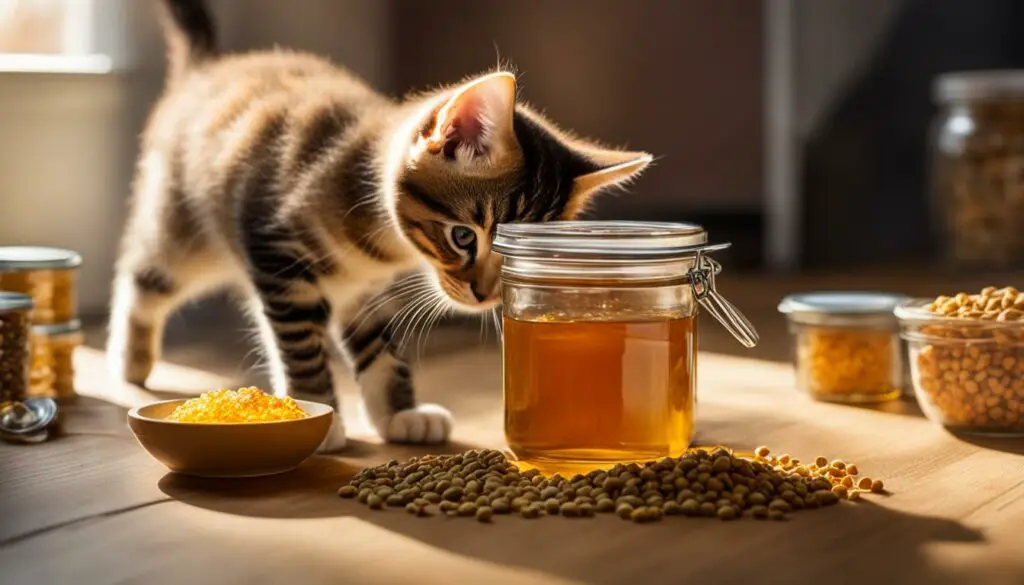
Risks of Feeding Kittens Honey:
To summarize the risks of feeding kittens honey:
- Honey can pose a choking hazard due to kittens’ small throats.
- Bacterial spores in honey can cause serious illness, such as botulism, in kittens.
- Kittens’ developing immune systems are more vulnerable to potential health risks from honey consumption.
By avoiding honey and focusing on a balanced diet specifically formulated for kittens, you can ensure their optimal health and well-being.
Honey and Veterinarian Guidance
When it comes to introducing honey into your cat’s diet, it is crucial to consult with a veterinarian. They can provide valuable guidance based on your cat’s individual health needs and dietary requirements. Veterinarians are knowledgeable about the potential benefits and risks associated with feeding honey to cats and can make informed recommendations tailored to your cat’s specific circumstances.
Your veterinarian will consider factors such as your cat’s age, overall health, and any underlying medical conditions before determining if honey is suitable for them. They can assess whether the potential benefits of honey, such as its antioxidant and antibacterial properties, outweigh any potential risks.
Veterinarians can also help you determine the appropriate amount of honey to incorporate into your cat’s diet if it is deemed safe. They can provide guidance on the frequency and portion sizes to ensure your cat’s dietary balance is maintained. It’s important to remember that honey should only be used as a supplement and not as a replacement for a high-quality cat food formulated for their specific nutritional needs.
| Veterinarian Guidance for Feeding Cats Honey |
|---|
| Consult with a veterinarian before introducing honey into your cat’s diet. |
| Consider your cat’s individual health needs and dietary requirements. |
| Assess the potential benefits and risks of feeding honey to cats. |
| Determine the appropriate portion sizes and frequency of honey consumption. |
| Use honey as a supplement, not a replacement for a balanced cat food diet. |
By seeking guidance from a veterinarian, you can ensure that any dietary changes or additions, including the incorporation of honey, are done in a safe and appropriate manner. Your veterinarian’s expertise will help you make informed decisions about your cat’s diet and overall wellness, prioritizing their health and well-being.
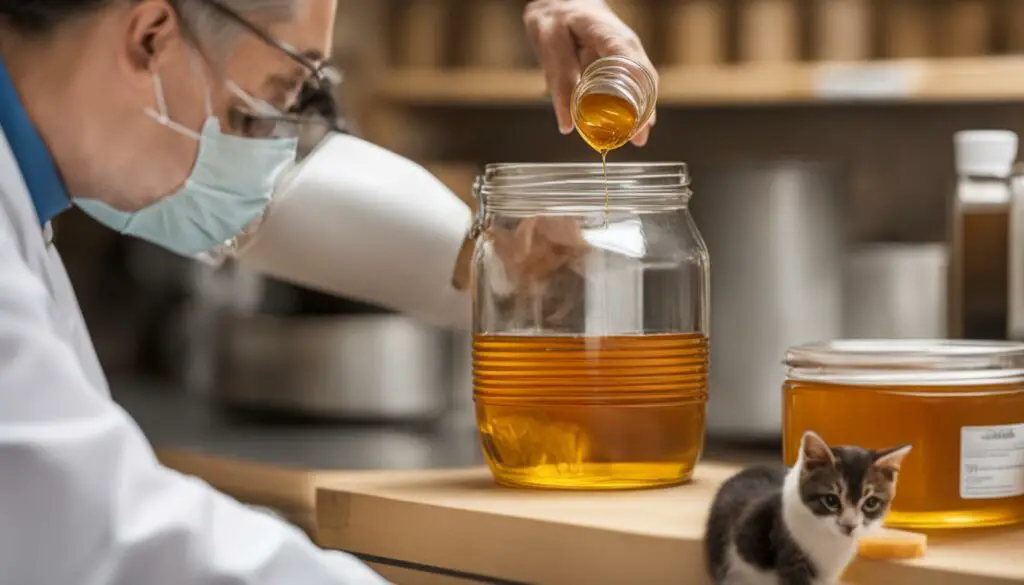
Honey as a Potential Medicinal Solution for Cats
When it comes to using honey as a medicinal solution for cats, there is limited research available specifically on its effects. However, honey has been traditionally used for its medicinal properties in humans and some animals. Veterinarians have utilized honey, particularly raw manuka honey, for wound management in cats due to its strong antibacterial properties. Although the scientific evidence is limited, the potential benefits of honey for cats’ health cannot be ignored.
Raw manuka honey, produced by bees in New Zealand and Australia, has been found to promote the natural healing processes in wounds and has shown antibacterial effects. Its unique properties make it a potential option for managing wounds in cats. However, it is crucial to seek veterinary guidance before using honey as a medicinal solution for cats. A veterinarian will be able to assess the specific health needs of your cat and determine the most appropriate course of action.
Using honey as a medicinal solution for cats should always be done under the guidance of a veterinarian. While honey may offer potential benefits, it is important to remember that cats have different dietary needs and their overall health should be the top priority. Consultation with a veterinarian ensures that any treatment decisions are based on the individual cat’s needs and circumstances.
It’s worth mentioning that honey should not replace proper veterinary care and treatment. If your cat is experiencing any health issues, it is essential to consult with a veterinarian for a professional diagnosis and appropriate treatment plan. Honey should be used as a complementary treatment option alongside the recommended medical interventions provided by your veterinarian.
| Key Points | |
|---|---|
| Honey, particularly raw manuka honey, has strong antibacterial properties that may aid in wound management for cats. | |
| Using honey as a medicinal solution for cats should be done under the guidance of a veterinarian. | |
| Honey should not replace proper veterinary care and treatment. | |
| Consult with a veterinarian for a professional diagnosis and appropriate treatment plan for your cat’s health issues. |
Homemade Honey Treats for Cats
As a cat owner, I am always looking for ways to treat my furry friend while ensuring their health and well-being. That’s why I love making homemade honey treats for my cat. Not only are these treats delicious and easy to make, but they also provide a safe and controlled way to incorporate honey into their diet.
Honey is a natural sweetener that can add a touch of sweetness to your cat’s meals or treats. It’s important to note that honey should be given to cats in small quantities as a treat, as opposed to a regular part of their diet. Too much honey can lead to weight gain, digestive issues, and possible risks associated with feeding cats honey.
Here is a simple recipe for homemade honey treats that your cat will love:
| Ingredients | Instructions |
|---|---|
| 1 cup of whole wheat flour | In a bowl, mix the whole wheat flour and honey until well combined. The dough should be firm but pliable. |
| 1/4 cup of milk | Gradually add the milk to the dough, mixing well until a dough ball forms. |
| 1 tablespoon of catnip (optional) | If desired, add catnip to the dough and mix until evenly distributed. |
| 1-2 teaspoons of honey | Add the honey to the dough and mix until fully incorporated. Adjust the amount of honey based on your cat’s preference for sweetness. |
| Preheat your oven to 350°F (175°C) and line a baking sheet with parchment paper. | |
| Roll the dough into small balls or use a cookie cutter to create fun shapes. | |
| Place the treats on the prepared baking sheet and bake for 15-20 minutes, or until golden brown. | |
| Allow the treats to cool completely before serving to your cat. Store any leftovers in an airtight container. |
Remember to always monitor your cat’s reaction to the treats and consult with a veterinarian before introducing any new ingredients into their diet. Homemade honey treats should be given in moderation and should not replace a balanced cat food diet.
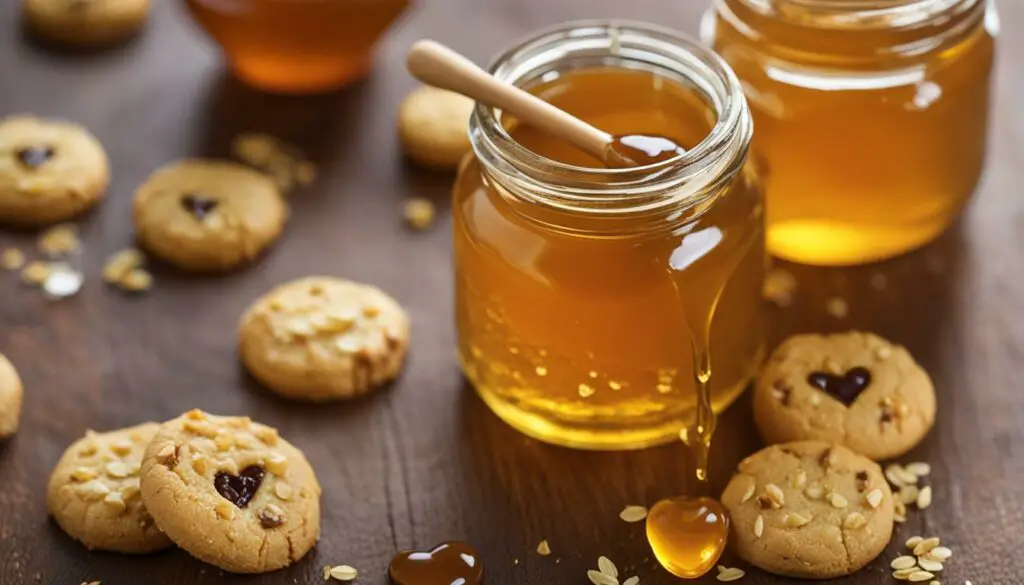
The Importance of a Balanced Diet for Cats
When it comes to the health and well-being of our feline companions, providing them with a balanced diet is crucial. Cats have unique dietary needs as obligate carnivores, and their nutrition plays a significant role in their overall health. A balanced diet for cats ensures that they receive the essential nutrients they need to thrive and maintain optimal body condition.
One of the key aspects of a balanced diet for cats is a focus on animal-based protein. Cats require high levels of protein in their diet to support their muscle development, organ function, and overall energy levels. This protein should come from high-quality sources such as meat, poultry, or fish. Plant-based proteins are not as easily digestible for cats and may not provide the full range of essential amino acids they require.
| Nutrient | Role | Sources |
|---|---|---|
| Protein | Supports muscle development, organ function, and energy levels | Meat, poultry, fish |
| Fat | Provides energy and supports healthy skin and coat | Fish oil, chicken fat |
| Vitamins and Minerals | Essential for overall health and proper bodily functions | Meat, fish, vegetables |
| Water | Hydration and proper bodily functions | Freshwater and wet cat food |
In addition to protein, cats also require a moderate amount of fat in their diet. Fat provides a concentrated source of energy and is essential for the absorption of certain vitamins. High-quality fat sources like fish oil or chicken fat can support healthy skin and coat, as well as provide necessary fatty acids.
Vitamins and minerals are also crucial components of a balanced cat diet. These nutrients play various roles in maintaining overall health and supporting bodily functions. Meats, fish, and vegetables are excellent sources of vitamins and minerals for cats.
Finally, it’s essential to ensure that cats have access to fresh water at all times. Proper hydration is vital for their overall health and helps support the proper functioning of organs and bodily systems. Wet cat food can also contribute to their daily water intake.
By providing a balanced diet that meets their specific dietary needs, we can help our cats lead healthy and happy lives. Consult with a veterinarian to determine the best diet for your cat based on their age, activity level, and any specific health conditions they may have. Remember, a well-nourished cat is a cat that can thrive!
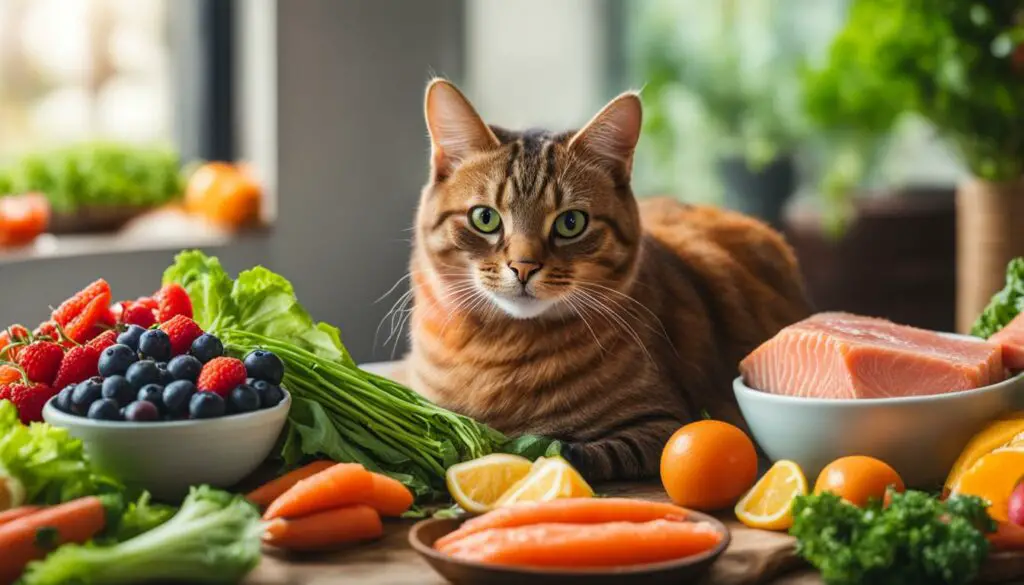
Conclusion
In conclusion, the question, “Can cats have honey?” does not have a straightforward answer. While honey offers potential benefits for cats due to its antioxidant and antibacterial properties, it’s important to approach its use with caution. Cats are obligate carnivores and have different dietary needs than humans. Consulting with a veterinarian is crucial before introducing honey into a cat’s diet.
Although there is limited evidence on the specific benefits of honey for cats, some cat owners may choose to incorporate small amounts of raw honey into their cat’s diet for potential health benefits. However, it’s important to start with a small amount and monitor the cat’s reaction. Raw honey is preferred over processed honey because it retains more of its natural benefits.
It’s important to note that honey is not a necessary dietary supplement for cats. A balanced diet that meets all of their nutritional needs, including animal-based protein, is the best way to ensure their overall health. Treats made with honey can be enjoyed occasionally, but they should not replace a balanced cat food diet. Always consult with a veterinarian for guidance on homemade treats and appropriate portion sizes.
In conclusion, the well-being of your cat should be the top priority when considering the use of honey in their diet. Veterinary guidance and monitoring are key to ensuring that any changes or additions to their diet are suitable for their individual needs. Remember, cats have specific dietary requirements, and it’s important to prioritize their overall nutrition above all else.
FAQ
Can cats have honey?
While honey is not considered toxic to cats, it’s important to note that cats have different dietary needs than humans. It’s best to consult with a veterinarian before introducing honey into a cat’s diet.
What are the potential benefits of honey for cats?
Honey offers potential benefits to cats due to its antioxidant and antibacterial properties. However, the scientific evidence is inconclusive and there is limited research on the specific benefits of honey for cats.
Can honey soothe cat allergies?
While honey is a natural antioxidant and may boost the immune system, there is limited evidence to support the use of honey as a treatment for cat allergies. It’s important to consult with a veterinarian for proper allergy management in cats.
What are the risks of feeding cats honey?
Cats, especially kittens, may have difficulty swallowing honey due to their small throats and stomachs. Honey can also cause digestive issues, such as vomiting and diarrhea, in some cats. Additionally, honey is calorie-dense and can contribute to weight gain, which is a concern for diabetic cats.
Can manuka honey be used for wound management in cats?
Manuka honey has been used for wound treatment in cats due to its strong antibacterial properties. However, it should only be used under the guidance of a veterinarian.
Is honey a necessary dietary supplement for cats?
Honey is not a necessary dietary supplement for cats. It’s best to focus on providing them with a balanced diet that meets all of their nutritional needs.
Is raw honey better for cats than processed honey?
Raw honey retains more of its natural benefits, such as antioxidants and antibacterial properties, compared to processed honey. If using honey for cats, it’s best to choose raw and locally sourced honey.
Can kittens have honey?
It’s generally not recommended to feed honey to kittens due to their small throats, stomachs, and developing immune systems. Honey can be difficult for kittens to swallow and they are at risk of developing botulism, an illness caused by a bacterium found in honey.
Why should I consult with a veterinarian about honey for cats?
It’s important to consult with a veterinarian before introducing honey into a cat’s diet. They can provide guidance based on the individual cat’s health needs and dietary requirements.
Can honey be used as a medicinal solution for cats?
Honey has been used for wound management in cats, but there is limited evidence to support its use for other health issues in cats. It should be used under the guidance of a veterinarian.
Can I make homemade honey treats for my cat?
Homemade honey treats can be an option for cat owners who want to incorporate honey into their cat’s diet in a controlled way. However, treats should be given in moderation and should not replace a balanced cat food diet.
How important is a balanced diet for cats?
A balanced diet that meets all of their nutritional needs is essential for cats. Cats are obligate carnivores and require a diet that includes animal-based protein. Any dietary supplements, including honey, should be used under the guidance of a veterinarian.
Is it safe for cats to have honey?
While honey is not considered toxic to cats, it’s important to approach its use with caution and seek veterinary guidance. Cats have different dietary needs than humans, and any changes or additions to their diet should be made under the guidance of a veterinarian.

